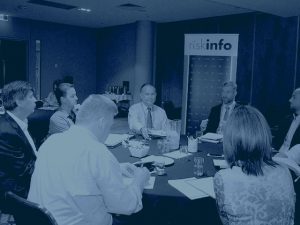Being aware of how to win and keep clients is important but having an awareness of your own behaviours that put clients off, or even drives them away, is also vital.
Jim Prigg from KnowledgeMaster writes that simple and thoughtless practices and habits may be driving current and potential clients away without you even realising it.
In a reversal of what many experts say what you should do, he shares the behaviours you should avoid to prevent sabotaging your own best efforts.
There are many ways to win clients and many ways to keep and retain them…but have you thought about the things that drive potential and existing clients away from you.
This aspect of your client relationship skills is just as important as finding and retaining those who want to engage with you.
By simple, offensive and thoughtless practices and habits you may be driving potential business away without even realising it.
Here are a range of things to be aware of that may drive clients away or repel them from wanting to do business with you.
Dominating the Conversation
As an adviser you are there to listen, gather facts, encourage your client to talk, facilitate dialogue, make helpful suggestions and provide a solution once the customer understands the problem they have. Dominating or overwhelming the conversation about what you know can put people off very quickly. Allow people to have dialogue with you. They enjoy and require to put their point of view to you. Listening rather than talking will reveal much more information that can be utilised in the initial and ongoing advice process.
Finishing Your Client’s Sentences
Let your clients complete their own thoughts and opinions in their own words. If you know what they are going to say, why are you there in the first place? By all means clarify their queries by feeding them back to them with expressions such as: “What you are telling me is …”, but let them complete their verbal thought expressions. When they say it, they believe it and it will allow them to validate their own thoughts.
Interrupting the Train of Thought
When clients are speaking and expressing an opinion or idea, then you listen. Let them talk. Don’t interrupt them until they are finished. Hear them all the way out. Even question them to further tease out what they are trying to find out. While they talk you can think and plan the route you wish to take in the advice process.
Talk Too Much About Cost Instead of The Value of Your Advice
Your time has no value to clients but the results you may produce for them does have value, regardless if how long it took to produce it. Yet, that value is only realised if they implement the advice you have provided.
People pay for your capability to do the following:
- Add value
- Relieve complexity
- Solve problems
- Save money, and time
- Deliver pleasant outcomes or experiences.
Consider developing a one page benefits sheet for your clients built around these points that show the value of your advice.
Avoiding Eye Contact
Good eye contact is an integral part of good communicating. If we fail to adequately use effective eye contact, doubts can arise in your client’s mind about you or your message. Lack of effective eye contact can give rise to poor rapport that may leave some people feeling uncomfortable.
Not Smiling
A genuine smile is a fantastic ally when deal with people face to face. It is very hard to convey a positive impression if you are a grump or sour faced presenter. An occasional smile is worth its weight in gold. Happiness is transmittable and can effectively help to bond customers to you
Fidgeting, Sighing, Yawning or Showing Signs of Boredom or Impatience.
People notice these rude or dismissive actions and can be offended by them. If they are not made welcome then they will vote with their feet and leave or devise an excuse to do so. Customers’ radar pick up on the offensive, disinterested and rude attitudes of those who act in that way.
Constantly Glancing at Your Watch
This conveys to your client that you have somewhere else more important to go. They may think they don’t count and feel uncomfortable staying. If you are expecting an important call at a particular time let the customer know.
Forgetting to Thank Clients For Their Time at The Start of a Meeting
Courtesy is catching. Saying thank you up front to people for their valuable time can carry right through the advice process. Simply saying, “Thank you for being on time” or “I really appreciate you giving up your valuable time to see me today” or “Thank you for accepting my invitation to attend our information session“.
Poor Time Management Skills
Be ready for clients. Don’t keep them waiting as a previous appointment drags on or you are taking other calls. Treat every prospect as if they are the most important person in your life at that point in time.
Leave plenty of time to arrive at appointments if you are seeing prospects at their offices or a neutral venue. Take into account parking arrangements. Factor in transport arrangements for air travel, taxis, bus or train timetables.
Allow plenty of face time with prospects if discussions run over the time frame for what you had budgeted for.
Not Dressing Appropriately
Dress is important in conveying a professional image. The manner in which you dress can give a very strong message about how you feel about yourself, your job and in some cases your services when you are meeting people face to face. Your dress can help or hinder your cause depending on what is expected of you. The “I’m cool look” in jeans and a T-shirt might be okay for computer nerds, advertising gurus or repair men, but professionals need to impart professionalism, so dress accordingly.
Personal Hygiene
Take care with things like overpowering after shaves and perfumes, strong body odour, breathe freshness, hair care, excessive make up, cigarette or alcohol breathe and general cleanliness. It may seem of little importance to you but these things can put people offside very quickly.
Actions and Activities
- Which of these attributes can you eliminate from your behaviour and presentation skills?
- Before you undertake your next few client meetings run through this list to make sure you are not repeating these mistakes.
3. Role play these incidents and situations with your team to see how you should handle

This article is reprinted with permission from Jim Prigg CEO and founder of Knowledgemaster Pty Ltd. Knowledgemaster is an online resources company that delivers practical communications, interaction, sales and soft skills tips, tactics, techniques. Learn more about winning business programs and courses by contacting Jim.
Contact Jim Prigg to learn more about winning business programs and courses.
Contact or follow the author: Website | Email | Telephone: 03 5232 1500, 0408 520 453











